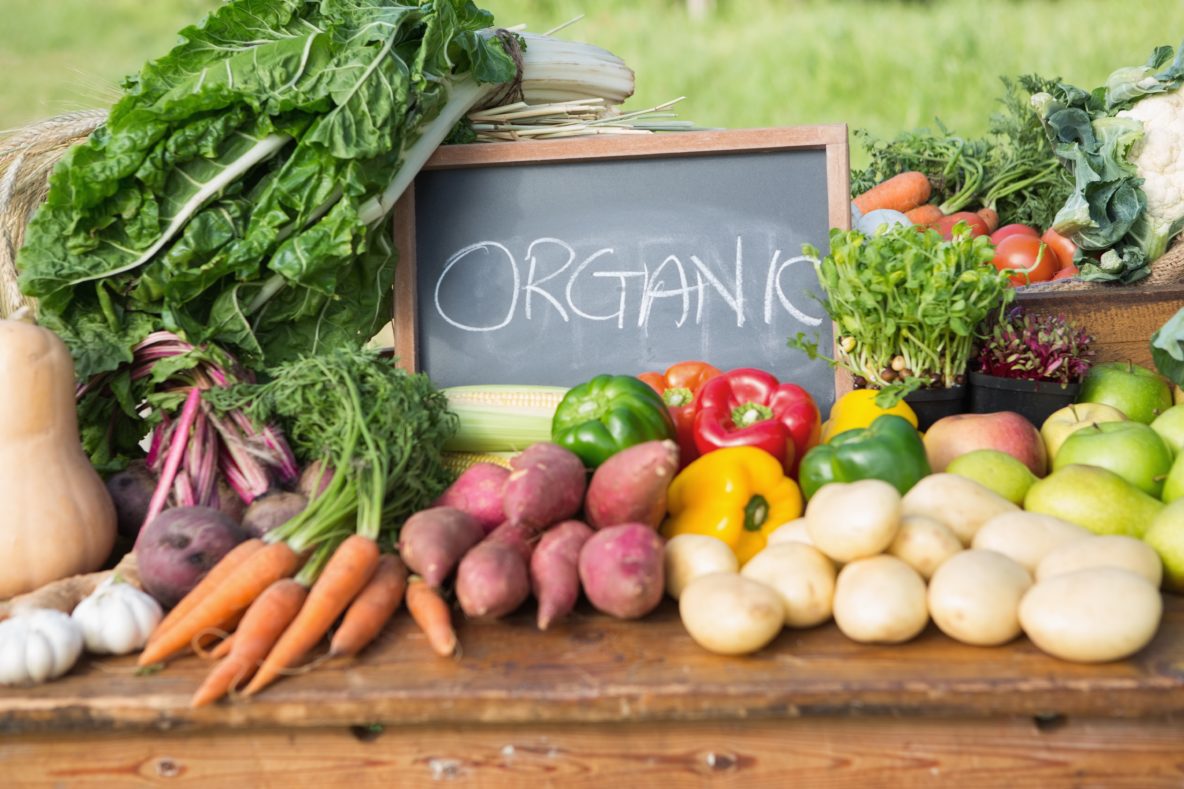Organic foods are often more expensive and not always available. It’s often a tricky choice. Is it worth spending the extra money?
In an ideal world, we’d all be buying locally grown foods, having chickens in our back gardens for eggs, and living the Good Life (am I showing my age here??).
Most of us don’t have the time, space or energy for that! But we do want to make the right choices for our health.
You can watch the video below or listen to the podcast.
Is organic more nutritious?
If you look at the research, it’s a mixed bag.
The Soil Association say yes. They quote a study done at Newcastle University in 2014 which found organic crops are up to 60% higher in a number of key antioxidants than conventionally-grown ones.
Other studies have found very little difference in nutrient levels between organic foods and non-organic produce.
Are organic foods better for your health?
For me this is undoubtedly a YES. Purely because most non-organic foods are produced using chemical pesticides. And these have been unequivocably lnked to many health issues, rangeing from headaches and digestive issues to more serious conditions such as cancer and reproductive harm.
The World Health Organisation have been saying for years that although individual pesticides are tested and deemed ‘safe', it’s the multiple exposure and bio-accumulation that has not been tested and could be harmful to health.
And when pesticides are used on fruit and veg, they are then transferred to animals eating grass and plants, so it goes up the food chain.
Pesticides are a known EDC (Endocrine Disrupting Chemical) – that means they can seriously mess with your hormones!
The way they do that is to MIMIC, BLOCK or ALTER hormones (including oestrogen, progesterone, testosterone and thyroid). Here are a few of the ways they can disrupt your hormones;
- Infertility & miscarriage
- Low sperm count
- Early puberty
- Hormone driven cancers
- Thyroid impairment
And what about if you’re going through menopausal changes? Our Oestrogen/Progesterone balance is crucial to how we feel, and with fluctuations during menopause, we don’t need anything else adding to the disruption!
Pesticides are toxic by design – they kill insects, weeds, small animals or organisms that could threaten the plants they are designed to protect. But we humans also have microbes inside us, we host a whole ecosystem of living things – so what happens to that?
There are very few studies on this yet, but I’m sure we’ll see links between these chemicals and our gut health.
My top foods to choose organic
- Meat – while we’re still in the EU we are protected against the use of hormones in animal production, however once we’re out, who knows what will happen? The standards in the US are much lower (chicken washed in chlorine with added arsenic anyone?). Organically raised animals are given more space, allowed to graze in the open and live a happier life. One study showed a direct link between stress hormone levels in the meat and human health! Buying organic meat but less often would be my personal choice.
- Eggs – similarly eating organic eggs (from organic chickens eating what they’re designed to eat; insects, grasses, bugs – NOT just grains!) ensures you get the best quality eggs without having to look after chickens in your back garden! Did you know pesticides are fat soluble so they can make their way into the egg yolks!
- Dairy – organic milk does seem to have a higher nutrient profile than non organic milk, and its coming from cows that are allowed to graze freely. On top of that, conventional dairy cows are fed on corn and soy that are also grown using pesticides, which often show up in the dairy products. It also tastes better !
- Fruit – especially berries, apples, pears, peaches/nectarines, grapes, cherries – these softer fruits are particularly sensitive to pesticide exposure, as they don’t have a tough outer skin for protection.
- Baby food – babies are far more susceptible to pesticides, especially Endocrine Disrupting Chemicals as they are still developing their reproductive systems. We know pesticides can disrupt child development, right from the womb.
- Greens, including spinach, kale, salad leaves – delicate greens are particularly exposed to pesticides due to their large surface area. And they are hard to scrub clean!
- Celery – being porous, it’s particularly easy to absorb chemicals.
- Tomatoes – one of the few fruits that has been proven to be more nutritious in organic form.
- Potatoes – even if you peel your spuds, they’re likely to contain pesticides. If you eat them regularly, try to buy organic.
- Bell Peppers & chilli’s – colourful peppers and chilli’s have been found to contain a high amount of pesticides. Cooking and scrubbing can help.
So if you can spend a bit more on these organic foods, I recommend it.
And if not, please don’t avoid them altogether. Just cook or give them a good scrub to minimise any residues. It would be a shame to miss out on the health benefits of these important foods!
For more info on this topic, visit the Environmental Working Group website.
And don’t forget, if you need help with your hormones or other health issues, get in touch and we can set up a free call.

